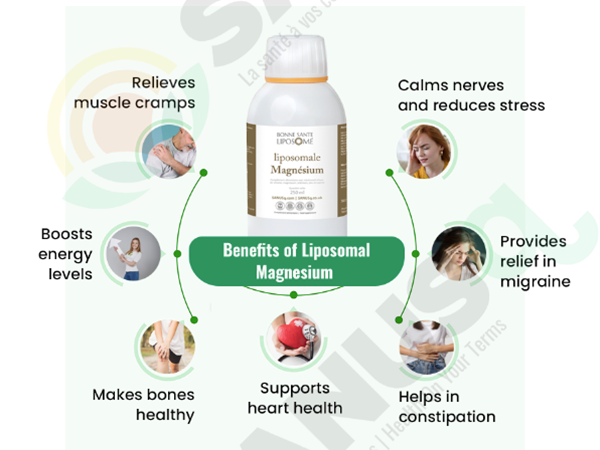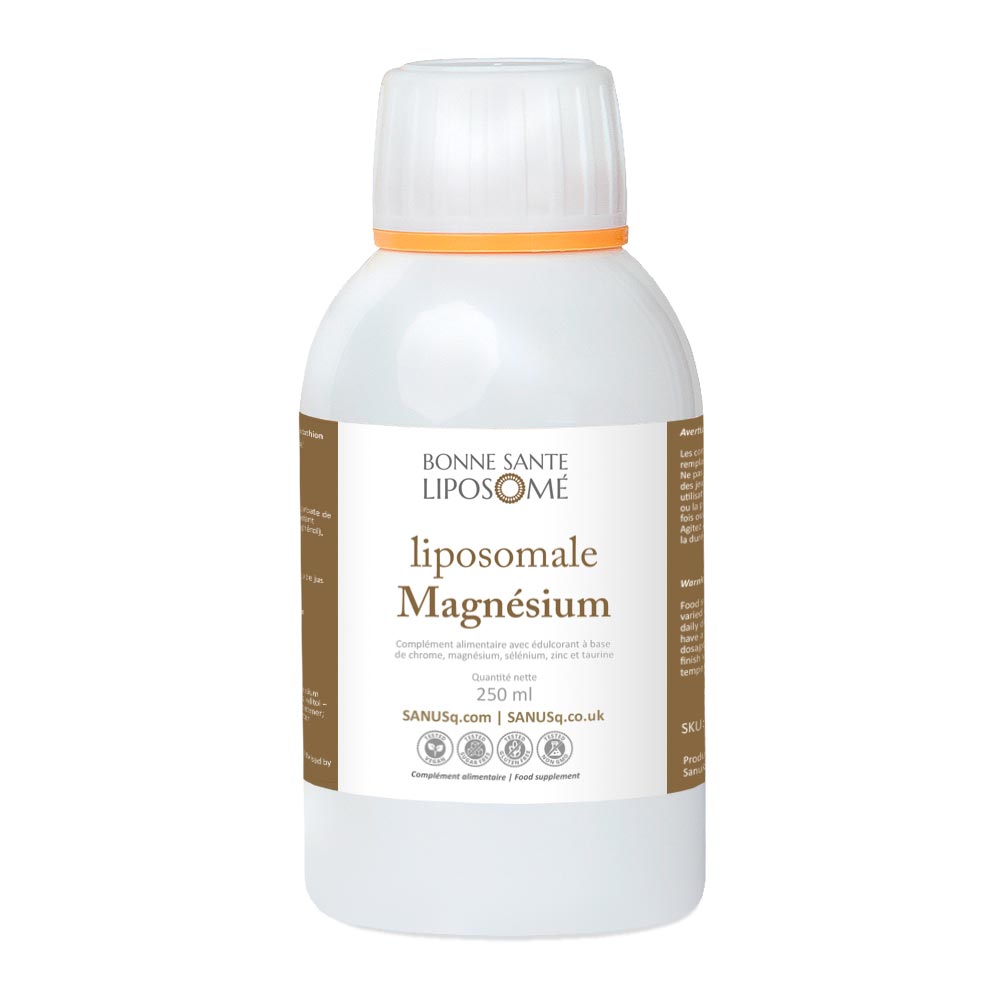SANUSq Health: Liposomal Magnesium - 250ml
Liposomal Magnesium for healthy muscles, nerves and heart
📅 Best before: 1 December 2027
🌍 Origin: The Netherlands
✅ Registered with DGCCRF (France): #2022-10-496
- French government certified for safety and compliance [View PDF Certificate]
🔖 SKU: BSL05-SR16-250
📊 Barcode: 8271510333250
(Check our current promotions before buying)
Main ingredients: (per 10 ml) 625.0 mg Magnesium bisglycinate; 62.5 mg Magnesium; 7.8 mg Zinc bisglycinate; 1.6 mg Zinc; 9.1 μg Selenium; 7.3 μg Chromium; 50 mg Taurine. Refer to label for full list of ingredients.
Suggested daily dosage: 2 x 5 ml directly in mouth or glass of water or juice, unless otherwise advised by a healthcare professional. Do not exceed recommended dosage. Discount bundle available (Click here)
Recommended serving size: 10 ml
Servings per bottle: 25
Storage: Store cool and dry. When opened store in refrigerator and finish within 2 months.
Product description
- Registered with the DGCCRF (France) #2022-10-496 [View PDF Certificate]
- Official French government certification ensuring compliance with EU supplement safety standards.
- 625.0 mg Magnesium bisglycinate per serving
- 62.50 mg Magnesium per serving
- Unique magnesium composition with other minerals such as zinc, selenium, chrome and taurine
- Liposomal magnesium for improved bioavailability and absorption
- Vegan, Non-soy, Non-GMO, Sugar free, Gluten free
- Screw top bottle with measuring cup
Liposomal Magnesium Health Benefits in a nutshell
- Relieves muscle cramps
- Helps in making healthy bones
- Maintains heart health
- Reduces PMS symptoms
- Relieves stress and promotes sound sleep
- Protects against radiation damage
- Helpful in migraines
- Improves asthma symptoms
Why do you need Magnesium?
Magnesium is an incredibly important mineral that helps fire up hundreds of bio-chemical reactions in the body required for: [1]
- Energy production
- DNA and protein synthesis
- DNA repair
- Regulating calcium levels
- Glucose metabolism
- Regulating hormones and neurotransmitters
- Healthy functioning of nerves and muscles
- Vitamin D metabolism
- Regulating blood pressure
- Glutathione synthesis
It is also required for a healthy immune system and a well-functioning nervous system, thus playing an important role in controlling pain, chronic inflammation and stress.
Some of the main health benefits of magnesium are derived from its ability to regulate calcium levels. Magnesium and calcium are two sides of the same coin. While magnesium helps muscles to relax, calcium is responsible for their contracting action. In addition, magnesium prevents excess calcium from entering the cells, which otherwise can cause many health conditions ranging from painful muscle spasms and twitches to migraines and irregular beating of the heart (arrhythmia).
Abnormal accumulation of calcium in kidneys, arteries, bones and intestines can also result in kidney stones, formation of plaque within arteries, osteoporosis and constipation. And all this happens when you have inadequate magnesium levels in the body.

1. Helps in ATP synthesis, improves energy levels
Magnesium deficiency often results in low energy levels and fatigue. There is a good reason for it. Magnesium is an important part of the ‘team of nutrients’ (magnesium, B vitamins, CoQ10 etc.) that your body needs to create energy.
- Helps in the production of ATP, the main source of energy for cells.
- Activates ATP so that it can be used by the cells. (ATP binds to magnesium ions to become activated)
2. Relaxes muscles and reduces pain
Magnesium helps muscles relax and prevents overexcitation of nerves. It also reduces neuropathic pain by preventing excessive stimulation of NDMA, a neurotransmitter associated with pain mechanisms. Sore muscles, leg cramps and Charlie horses are the most common signs of magnesium deficiency. Overall, magnesium:
- Relaxes muscles
- Provides relief in painful muscle spasms and leg cramps
- Provides relief in headaches and migraines, and may even prevent migraine attacks [2]
- May help in managing fibromyalgia symptoms
- Improves PMS symptoms
- Improves symptoms in people with chronic fatigue syndrome
3. Calms nerves and fights stress
Magnesium helps the body deal with stress much more effectively. People with a low magnesium level often develop symptoms such as frayed nerves, chronic fatigue, wide-spread pain, depression, anxiety and disturbed sleep. Magnesium helps in improving all of these symptoms due to its effect on the nervous system. It calms nerves and reduces stress by balancing neurotransmitters (hormones) associated with sleep, mood and anxiety. Overall, magnesium:
- Regulates calcium and glutamate, that causes excitability in nerves
- Increases GABA, a hormone that helps lower anxiety levels and helps you calm down
- Regulates stress hormone cortisol
- Helps in the production of serotonin, a hormone that regulates sleep and mood, among other things.
This is also how magnesium provides relief in fibromyalgia symptoms such as headaches, anxiety, muscle aches, sleep disturbances, stress and even depression. In fact, studies show that magnesium is effective in treating depression and disorders of nervous system. [3-5][] In addition, magnesium doesn’t cause serious side effects that are typically associated with using conventional anti-depressants.
4. Reduces risk of heart disease
Studies show that magnesium deficiency is associated with an increased risk of high blood pressure, angina, atherosclerosis, congestive heart failure and heart attack. [6] Magnesium helps in cutting down your risk of developing cardiovascular disease through a number of actions:
- Lowers blood pressure by relaxing blood vessels
- Prevents arrhythmia, keeps the heart beating rhythmically
- Prevents plaque formation by preventing calcium build-up in arteries (Atherosclerosis is a risk factor for heart attack or stroke)
- Prevents blood clotting
- Reduces stress and anxiety
- Lowers oxidative damage and inflammation, an underlying factor for heart disease
- Reduces the risk of diabetes and metabolic syndrome, high risk factor for heart disease
5. Makes bones healthy and strong
Maintaining a healthy magnesium status is important for your bone health. Magnesium influences bone health through various mechanisms: [7]
- Helps improve bone density
- Lowers risk of osteoporosis in women after menopause
- Lowers the risk of fractures
- Helps in calcium absorption and utilization
- Converts vitamin D into its biologically active form.
- Activates enzymes involved in vitamin D metabolism
- Stimulates calcitonin, a hormone produced by the thyroid gland. Calcitonin draws extra calcium from the bloodstream, kidneys, muscles and blood vessels and send it to the bones. This not only improves bone mineral density but also lowers the risk of other conditions related to calcium build-up.
6. Reduce the risk of type 2 diabetes
Magnesium deficiency is known to increase the risk of metabolic disorders such as obesity, type 2 diabetes and insulin resistance. In addition, people with obesity, type 2 diabetes and metabolic syndrome have been found to be deficient in magnesium. [8-9] Did you know people with high blood sugar levels tend to lose more magnesium while getting rid of excess sugar in the urine? This further adds to the deficiency.
High sugar levels in the bloodstream and insulin resistance cause oxidative damage in the blood vessels, resulting in inflammation, heart disease and kidney disease. Magnesium supplements can correct deficiency and reduce these risks. Magnesium may also be helpful for pre-diabetics as it appears to offset the risk of diabetes in people who are at a very high risk of developing the disease. [10]
Getting sufficient magnesium is very important in people with type 2 diabetes and pre-diabetes, as it:
This further reduces magnesium levels. In a nutshell, magnesium:
- Supports healthy glucose metabolism
- Improves insulin metabolism and sensitivity
- Improves oxidative stressand inflammation
- Reduces risk of insulin resistance, pre-diabetes and type 2 diabetes
Other health benefits of magnesium
- Improves many PMS symptoms such as pain, contractions, migraines and depression
- Protects from the damage caused by ionizing radiation
- Ensures proper functioning of proteins or enzymes used in DNA synthesis and repair
- Required in various detoxification pathways
- Helps in glutathione synthesis (a powerful antioxidant that plays a critical role in detoxification).
- Improves exercise performance (due to its role in energy metabolism, muscle functions and heart functions).
- Improves asthma symptoms and prevents flare-ups (as it reduces inflammation, improves pulmonary functions and relaxes airways).
- Gets rid of constipation
Bonne Sante Liposome Magnesium
Bonne Sante Liposome Magnesium is one of the few magnesium supplements that can boost your cellular magnesium levels without causing diarrhea. Oral magnesium supplements, available in powder or tablet form, work as laxatives. You can’t take high amounts without the risk of bloating, abdominal cramps and diarrhea. With Liposomal magnesium supplements, you can be assured of no such side effects while achieving better absorption by cells.
The concentration of magnesium in our Bonne Sante Liposome product per ml is lower than in traditional products, but several product characteristics assure better absorption of the magnesium in our product compared to traditional products. These are:
- Most significant is the fact that our product offers true liposomal enhancing absorption
- Our unique and patented recipe: the combination with the other minerals is proven to increase absorption itself
- We use magnesium bisglycinate: All mineral are absorbed in the body by the same mineral absorption pathway. This means that when zinc is absorbed, that system is busy and cannot absorb magnesium. For that reason we use magnesium bisglycinate which does not use the mineral complex absorption pathway, but the amino acid absorption pathway (it contains 2 glycine molecules, which are amino-acids)
By a combination of these factors, we estimate the absorption of our product to be ~10x better than traditional products.
References:
- Baaij et al. Magnesium in man: implications for health and disease. Physiol Rev. 2015
- Izabela Domitrz and Joanna Cegielska. Magnesium as an Important Factor in the Pathogenesis and Treatment of Migraine—From Theory to Practice. Nutrients. 2022.
- Eby et al. GA, Eby KL. Magnesium for treatment-resistant depression: a review and hypothesis. Medical Hypothesis. 2010
- Murck H. Ketamine, magnesium and major depression--from pharmacology to pathophysiology and back. Journal of Psychiatric Research. 2013.
- Tarleton et al. Role of magnesium supplementation in the treatment of depression: A randomized clinical trial. PLOS One. 2017.
- DiNicolantonio et al. Subclinical magnesium deficiency: a principal driver of cardiovascular disease and a public health crisis. Open Heart. 2018
- Kunutsor et al. Low serum magnesium levels are associated with increased risk of fractures: a long-term prospective cohort study. European Journal of Epidemiology. 2017
- Piuri et al. Magnesium in Obesity, Metabolic Syndrome, and Type 2 Diabetes. Nutrients. 2021
- Pelczyńska. The Role of Magnesium in the Pathogenesis of Metabolic Disorders. Nutrients 2022.
- Hruby et al. Higher magnesium intake reduces risk of impaired glucose and insulin metabolism, and progression from prediabetes to diabetes in middle-aged Americans. Diabetes Care 2014
- Dhillon, Deo, Fenech 'Low magnesium in conjunction with high homocysteine increases DNA damage in healthy middle aged Australians' European Journal of Nutrition. May, 2024

Disclaimer
Information on our websites, in our blogs and our emails are provided for informational purposes only, and have not been evaluated by the EMA, EFSA or FDA. It is not meant to substitute medical advice provided by your healthcare professional and is not intended to diagnose, treat, cure, or prevent any disease. Our products are intended for adults, 18 years of age and older. While Magnesium has been shown to have various health benefits, it is important to remember that supplements and dietary changes should be considered as part of an overall health plan and not as a substitute for professional medical treatment. Only a qualified healthcare practitioner can provide personalized advice and treatment plans based on your individual health needs and medical history, and you should seek advice from your healthcare professional before taking product(s) if you are pregnant or nursing.












 Pin it
Pin it


